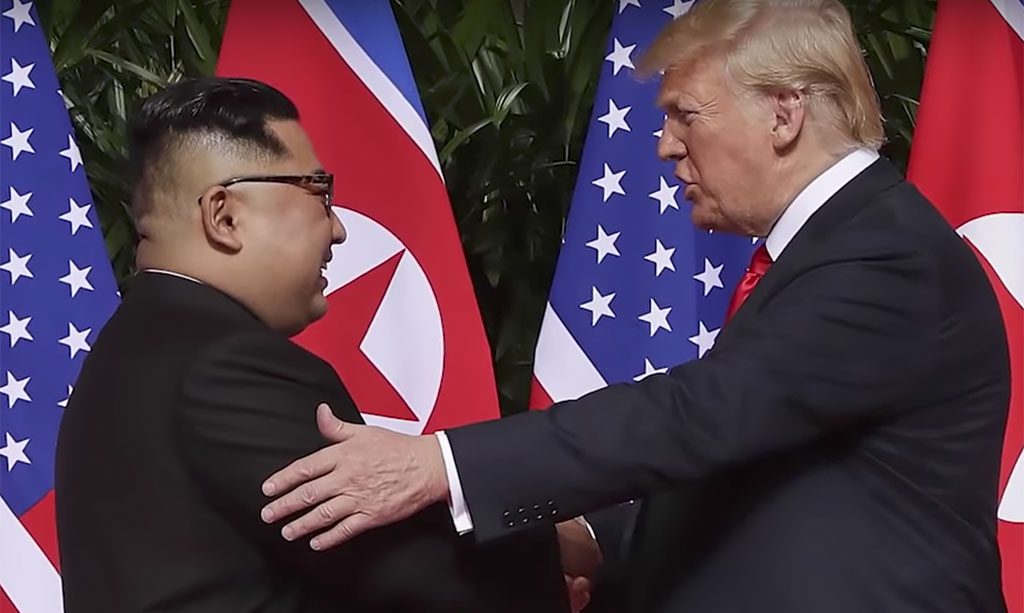Trump-Kim Summit: Real Peace or Fake News?
Screenshot taken from video
Today (June 12), the tiny island-state of Singapore hosted one of the most historic events of our generation—the summit between the president of the United States of America (US), Donald J Trump, and his counterpart from North Korea, Kim Jong Un.
The summit resulted in the signing of a joint declaration reaffirming North Korea’s commitment to the complete denuclearization of the Korean Peninsula, and the establishment of diplomatic ties between the US and North Korea.
This is a milestone in the tumultuous relationship between the US and North Korea. After decades of hostility and failed negotiations, Trump and Kim are the first heads of state from their respective nations to meet, making this an unprecedented and monumental event.
It was a recent change in North Korea’s political strategy which saw them shift the focus from nuclear armament to economic development, opening the door for negotiations with the US over terms of peace and denuclearization.
Amid the hullabaloo leading up to the event, many have picked up on the fact that Singapore—one of the few countries that has diplomatic ties with both the US and North Korea—will be footing a $15 million (USD) bill in the course of hosting the summit. This hefty charge is mostly made up of the security cost for the two world leaders. There are also other expenses: catering for a contingent of over 2,500 journalists from all over the world, facilitating their media coverage, as well as hotel accommodation for Kim.
Yet the Prime Minister of Singapore, Lee Hsien Loong, declared that the $15 million was a “cost we are willing to pay”, citing Singapore’s “profound interest” in achieving regional stability. His sentiments were echoed by Singapore’s Foreign Minister, Vivian Balakrishnan, who called their expenditure “an investment in world peace”.
And perhaps, if the Trump-Kim summit does eventually lead to lasting amity between the US and North Korea, Lee will be able to look back at the $15 million as irrefutably well spent. There is no doubt that the joint declaration signed by both leaders will go some way to creating goodwill and diplomacy between the two nations.
However, in reality, if any peace is achieved, it is likely to be fragile. After all, we are talking about two individuals who have been shown in various capacities to be temperamental. Since the start of Trump’s presidency, Trump and Kim have traded insults and threatening rhetoric, with both countries’ nuclear capabilities often warranting a mention. And merely weeks ago, Trump had canceled the summit, in retaliation to what he saw as “tremendous anger and open hostility” from North Korea, before performing a stunning U-turn a week later.
While the details leading up to the summit has provided much fodder for the press, what is more crucial is that the event itself clearly points towards this truth: We all aspire towards peace on earth and with one another. However, is that actually attainable?
History has shown that peace achieved through human relations or efforts offers no guarantees, neither is it the most important form of “peace”. What we should be more concerned with instead is peace with our Creator—this is the peace that has eternal value.
However, many of us are trying to pursue peace with God by our own means. We are tempted to look at our own works as the root of our salvation. We might use factors like how much we serve in church, how much discipline we can exert, or our spiritual experiences as an indicator of our status before God. We might even become prideful about the existence of these things in our lives, or shameful at their absence.
But the truth is, none of these things can offer us true peace.
In contrast, think about the peace deal that Jesus brokered for us, as described by Paul in Colossians 1:21-22:
Once you were alienated from God and were enemies in your minds because of your evil behavior. But now he has reconciled you by Christ’s physical body through death to present you holy in his sight, without blemish and free from accusation.
Our peace with God also came at a colossal cost that we didn’t even have to bear—the death of His son, Jesus Christ. In order to reconcile us with God, Jesus had to suffer at the hands of the Romans and Jews and eventually die a brutal death on the cross. Yet, unlike the Trump-Kim summit, the resulting peace is guaranteed.
That’s because of who Jesus is. As Colossians 1:15-20 says, Jesus is Himself God and supreme above all of creation; that means He is more than qualified and able to bring us peace.
And that’s why Paul starts his letter to the Colossians by encouraging the Christians in Colossae to not “move from the hope held out in the gospel” (Colossians 1:23). He wants the Colossians to know that nothing else can give them the guarantee of peace with God like Jesus can.
Ultimately, we need to place our trust in Jesus—who He is and what He’s done for us on the cross. It’s only through Jesus that we are able to stand before God without fear of judgment. He is the only one who can bring us lasting peace with God and the hope of salvation.
So, while the whole world watches as Trump and Kim take what we hope will be the first steps towards peace for this current generation, we can rest in the security that Jesus Christ has already brokered the best peace deal for those who place their trust in Him. His death and resurrection is sufficient to bring eternal and everlasting peace between God and those who love Him once and for all.










Trackbacks & Pingbacks
[…] Kim Jong-un shook hands in Singapore on 13 June, not once did I glance at a screen to find out how the summit went—even though this could potentially be a monumental first step for millions of North Koreans […]
Leave a Reply
Want to join the discussion?Feel free to contribute!